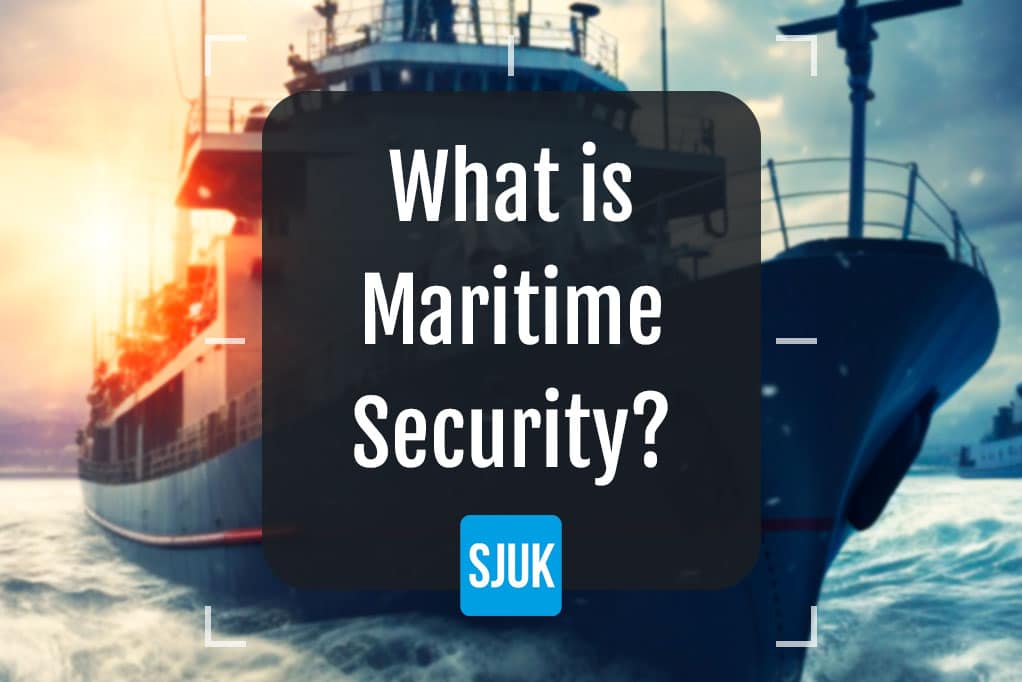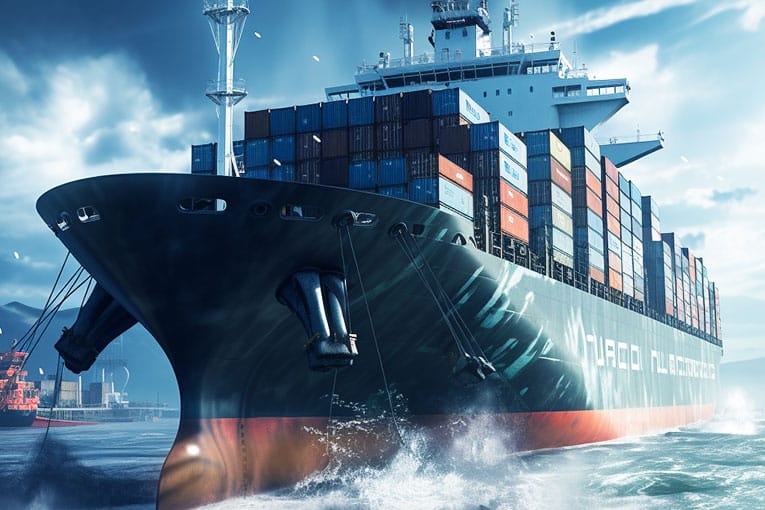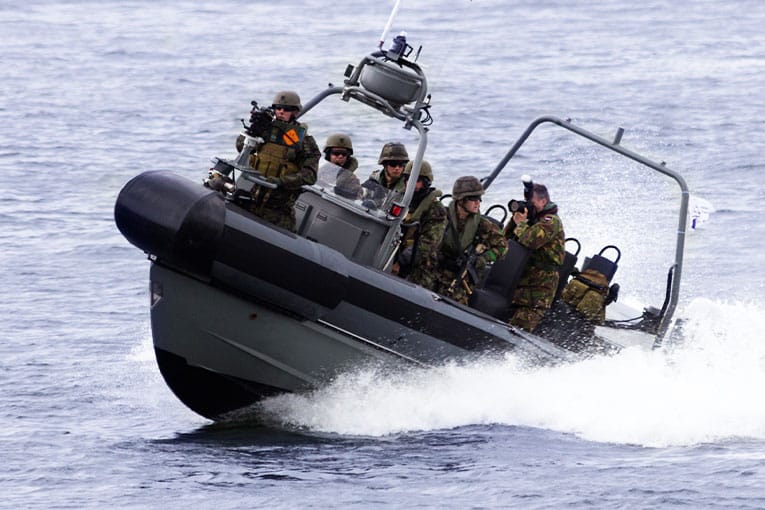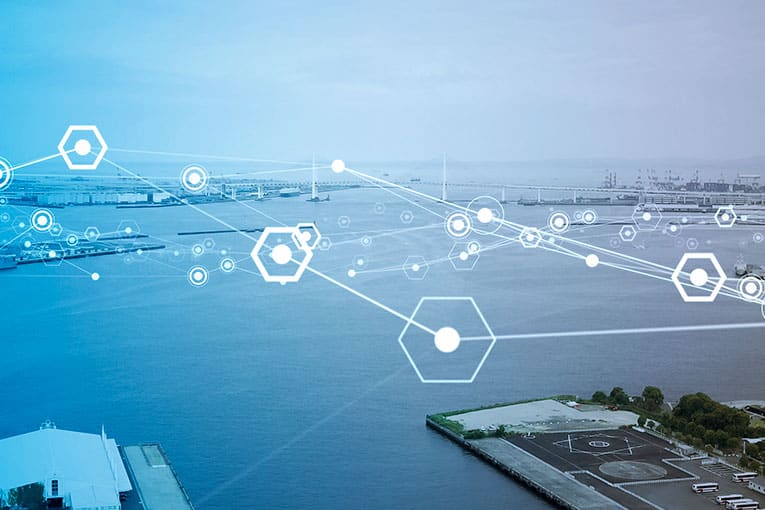
Our oceans cover more than 70% of the Earth’s surface, making them vital arteries of global commerce and communication.
From transporting goods and energy resources to enabling travel and tourism, maritime activities are the lifeblood of the global economy.
However, these vast expanses are not immune to risks and challenges.
As our world becomes increasingly interconnected, maritime security plays a crucial role in maintaining global trade, safeguarding national interests, and protecting the marine environment.

Answering the question of ‘what is maritime security’, and how it helps international safety is vital in understanding criminal activity around the globe.
Table of Contents
ToggleMaritime security combines the safeguarding of vessels from both internal and external threats.
These threats include terrorism, piracy, robbery, illegal trafficking of goods and people, illegal fishing, and pollution.
To mitigate these risks, various measures are put in place, like supervision, inspection, and proactive procedures that minimise both intentional and accidental threats.
As the industry evolves and expands, vigilance, enforcement, and training must keep pace with advancing technology and increased opportunities for threats.
In the aftermath of 9/11, there has been a heightened focus on protecting the marine sector from terrorist attacks, both in ports and at sea.
Numerous state and international organisations have collaborated to set standards and improve maritime security.
Given the vastness of the marine sector and the difficulty in screening the massive volume of goods entering countries, every possible precaution is vital to minimise malicious exploitation.
Maritime security is not solely the responsibility of vessel safety officers; it involves the entire crew.
Therefore, companies must prioritise education and training for their employees to enhance their vessels’ ability to deter and respond to security threats.
A well-informed and skilled crew plays a crucial role in maintaining the safety and security of maritime operations.
In this article, we will explore the common maritime security threats faced by the global maritime community, the tactics used to combat these threats, and the significance of international cooperation in enhancing maritime security.
Cargo theft poses a significant risk to maritime operations.
Criminals often target vulnerable vessels, seeking valuable cargo and goods to steal.
These acts not only result in financial losses for businesses but can also endanger crew members’ lives.
The problem of thievery is particularly prevalent in areas with inadequate surveillance and security measures.
Pirates and criminals take advantage of ships that traverse through poorly policed regions, where they can operate with relative impunity, and a lot of theft cases happen at a local level.
To combat thievery, maritime security efforts include employing advanced surveillance systems, enhancing onboard security measures, and implementing secure transit corridors in high-risk areas.
This includes the recent use of drones in Southhampton’s ports to combat this threat to maritime security.
Additionally, international cooperation among navies and law enforcement agencies has been instrumental in curbing piracy and reducing incidents of robbery at sea.
Trespassing on vessels can occur for various reasons, including illegal immigration, smuggling, and acts of terrorism.
Smugglers may attempt to transport contraband goods or illegal immigrants across maritime borders, taking advantage of the vastness of the sea and the challenges in policing every vessel.
Security officers play a vital role in ensuring that no unauthorised individuals come aboard their vessel while in port and tamper with sensitive equipment.
Even with the documented crew carrying out operations correctly, a trespasser meddling with cargo rigging or other critical gear can lead to serious consequences at sea.
On an international scale, large-scale security measures are directed towards more malicious operations rather than individual crimes.
These may involve acts of terrorism, environmental crimes, smuggling, and trafficking, posing significant threats that require proactive and coordinated efforts to protect the maritime domain.
Terrorist organisations pose a serious threat to maritime security, as they may exploit maritime routes to smuggle illicit goods, launch attacks on ports or vessels, and disrupt global trade.
The maritime domain offers opportunities for terrorists to move operatives, equipment, and contraband undetected, making it a potential gateway for large-scale attacks.
The risk of maritime terrorism demands significant coordination and proactive efforts from nations worldwide.
Multinational task forces, intelligence sharing, and joint patrols are necessary to identify and counter the threat of terrorism.
The enforcement of strict security protocols at ports and terminals, as well as onboard vessels, is critical in preventing acts of terrorism and safeguarding global supply chains.
These terrorist threats to maritime security are not just physical, they can also be digital in the form of cyber attacks. The UK government has increased its cybersecurity plans to deal with the increase of these digital threats.
Due to the continued growth in global trade, criminals are able to take advantage of the complex and vast nature of maritime shipping to engage in illegal activities, such as drug trafficking, arms smuggling, and human trafficking.
These criminal operations pose significant threats to international security and safety.
Ensuring maritime security is a challenging task for many reasons, for example, the sheer number of containers on each ship.
Criminals exploit this by attempting to smuggle their illegal goods without detection.
By strengthening security measures on ships and collaborating internationally, we can work towards thwarting criminal activities of this nature.
Although piracy might seem more a relic of the past than a threat to modern maritime security, it remains a huge threat to ships carrying valuable cargo, particularly in areas with weak governance and law enforcement.

Modern pirates are well-organised and armed with advanced communication and equipment.
They hijack vessels, sometimes taking crew members hostage for ransom, and steal valuable cargo.
Adequate training and experience in maritime security can empower crew members to prepare for and handle piracy attacks safely.
In addition, using patrol ships as a deterrent has been an effective way of combating piracy, with the UK recently deploying Royal Navy patrols to Africa to improve their maritime security.
Human trafficking and illegal immigration pose a significant challenge to international maritime security.
While illegal immigration and human trafficking can be caused by people fleeing political unrest or being unwillingly trafficked, both are still grave violations of human rights.
Traffickers tend to exploit vulnerable people and then subject them to forced labour, and other forms of modern slavery.
Traffickers often rely on trade routes to transport their victims, for example by concealing them in shipping containers or aboard fishing vessels.
The ocean has become an extension of global commercial operations, which has caused significant damage to the environment.
While measures have been taken to remedy this, the potential for further damage exists.
Because of this, marine security professionals are required to make sure their vessel’s activities do as little harm to the environment as possible.
Following regulations is essential, especially in industries like petroleum, to avoid accidents and protect the environment.
Emerging environmental terrorism has become a concern in recent years, with certain groups deliberately causing ecological harm for ideological or political reasons.
From dumping hazardous waste to attacking vessels carrying oil or other dangerous cargo; environmental terrorism can have severe and lasting consequences on the environment.
To effectively address the many threats to maritime security, security officers and maritime authorities use various tactics.

These tactics focus on preventive measures, early detection of threats, and coordinated response mechanisms to ensure the safety of vessels, crew members, and cargo.
Hopefully this article helped you gain an understanding of what is maritime security, and how it is an essential aspect of modern global governance that protects our oceans.
Addressing the common maritime security threats requires a comprehensive approach that involves international cooperation, the effective use of technology, and the commitment of maritime stakeholders.
From piracy and human trafficking to environmental disasters and terrorist threats, each threat requires a tailored response.
Implementing robust security measures, intelligence sharing, and training security personnel and crew members are vital steps in enhancing maritime security.
The UK understands the importance of maritime security and has rolled out a five step plan to improve it.
Additionally, promoting good governance and economic development in vulnerable regions can help address some root causes of maritime security threats.
By working together, nations can fortify their maritime security efforts, making the seas safer for trade, travel, and the environment.
As technology evolves and new challenges emerge, a continued dedication to maritime security is essential in preserving the health and environmental safety of our oceans for generations to come.